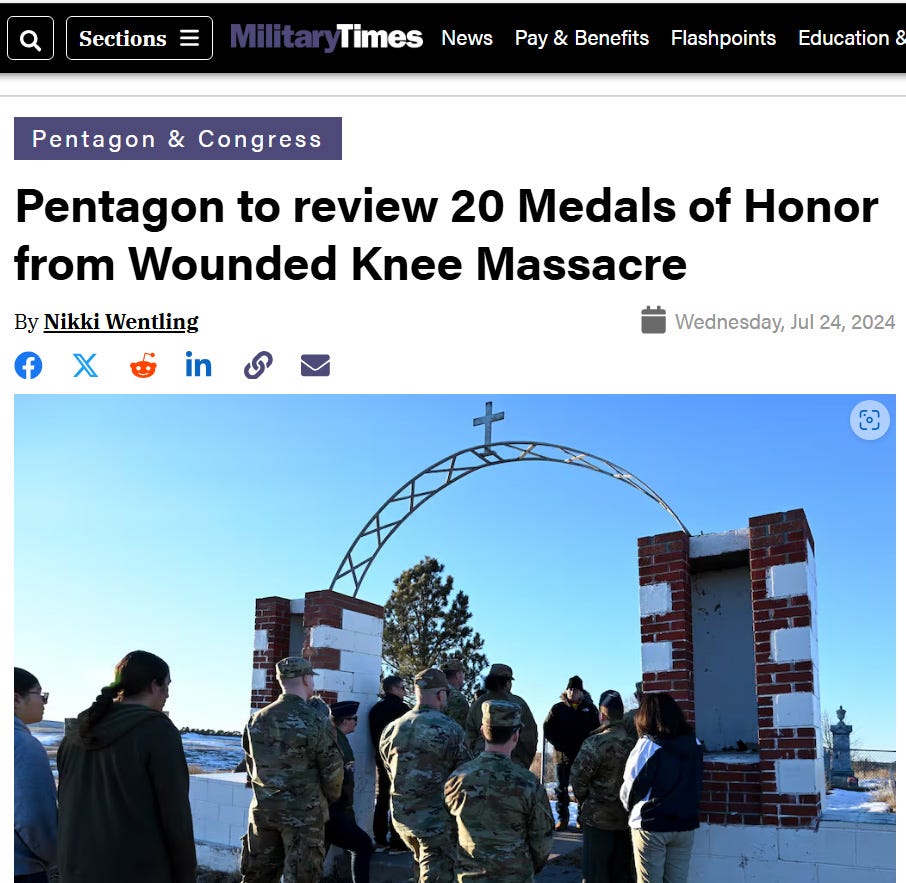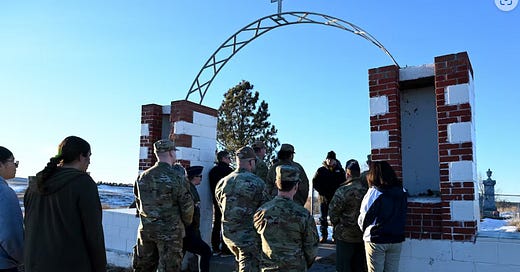The Medal of Honor's Rush Limbaugh moment
During his last State of the Union speech, Donald Trump sullied the Medal of Freedom by awarding it to Rush Limbaugh, four years before he further disparaged the American military by comparing the Medal of Freedom favorably to the Medal of Honor.
The comparison got me to thinking about the Medal of Honor’s Rush Limbaugh moment, more than a hundred years ago, which led to a serious revision of the qualifications for awarding the nation’s highest military honor. Even as I write this, a panel convened in July is considering rescinding some or all of the 20 Medals of Honor awarded to members of the 7th Cavalry who took part in the Massacre at Wounded Knee.

Defense Secretary Lloyd Austin directed the Pentagon to review the 20 Medals of Honor awarded to U.S. troops for their actions at Wounded Knee in 1890, when soldiers killed and injured between 350 and 375 Lakota men, women and children.
Austin ordered the creation of a special panel to determine whether to retain or rescind the medals, the Department of Defense announced Wednesday. In a July 19 memorandum ordering the review, Austin said the panel would investigate “each awardee’s individual actions” and also “consider the context of the overall engagement.”
“It’s never too late to do what’s right,” an unnamed senior defense official said in a statement Wednesday. “And that’s what is intended by the review that the secretary directed, which is to ensure that we go back and review each of these medals in a rigorous and individualized manner.”
The killings, referred to as the Wounded Knee Massacre, occurred Dec. 29, 1890, near Wounded Knee Creek in South Dakota. It was part of a larger effort by the U.S. government to repress Native American tribes of the Great Plains and eradicate a religious movement known as Ghost Dance.
Reports about the Ghost Dance movement prompted the U.S. Army to guard reservations. On Dec. 29, 1890, troops from the 7th Cavalry were confiscating weapons from Lakota people when a struggle with a reportedly deaf man sparked a chaotic one-sided firefight. When the smoke cleared, dozens of cavalry troopers were wounded or killed by friendly fire — likely from their artillery — and hundreds of Lakota were dead.
For their actions that day, 20 cavalrymen were awarded the Medal of Honor, the nation’s highest military honor. Austin’s memorandum lists the recipients, along with short descriptions of why each man received a medal.
One citation says a recipient showed distinguished conduct “in a battle with hostile Indians.” Another says one man “voluntarily led a party into a ravine to dislodge Sioux Indians concealed therein.”
A few citations said troops had rescued their fellow soldiers, and some said only that the men exhibited “extraordinary gallantry.”
Congress officially apologized for the massacre around its 100th anniversary in 1990, but it did not rescind the medals then. In 2022, Congress approved a measure encouraging the Pentagon to review the awards.
The panel reviewing the Medals of Honor will comprise five experts, including two from the Department of the Interior, Austin’s memo states. The panel is expected to submit a report to Austin by Oct. 15 with recommendations for each recipient, and then Austin will take those recommendations to President Joe Biden.
When reviewing the awards, panelists will consider the context at the time and use the military’s 1890 standards for awarding the Medal of Honor, rather than today’s standards.
Panelists will determine whether any of the soldiers did anything disqualifying them from the award, which includes intentionally directing an attack against someone who surrendered in good faith, murdering or raping a prisoner or engaging in any other act “demonstrating immorality,” Austin’s memo reads.
The U.S. Army was ordered to hand over all historical documentation about the massacre, including personnel files for the awardees, by Friday.
This story was produced in partnership with Military Veterans in Journalism. Please send tips to MVJ-Tips@militarytimes.com.




